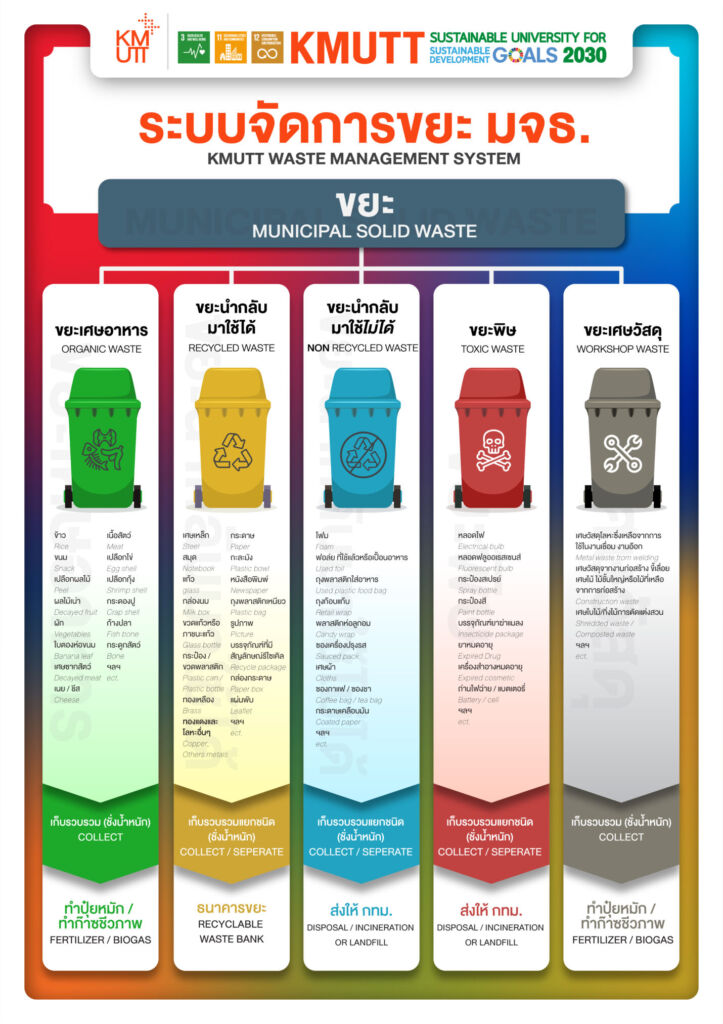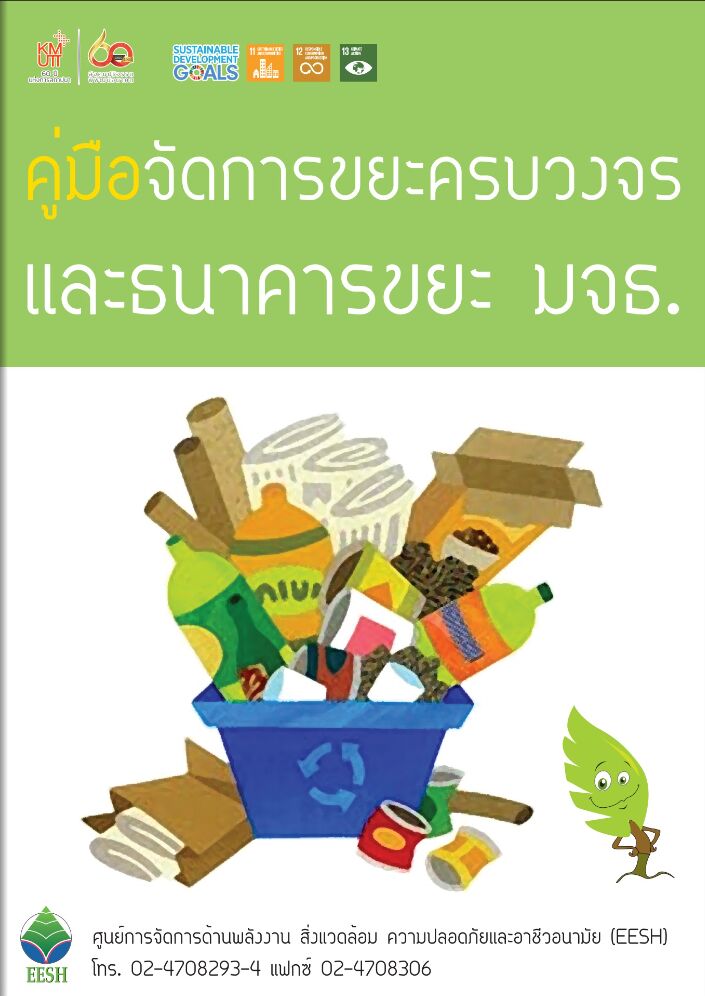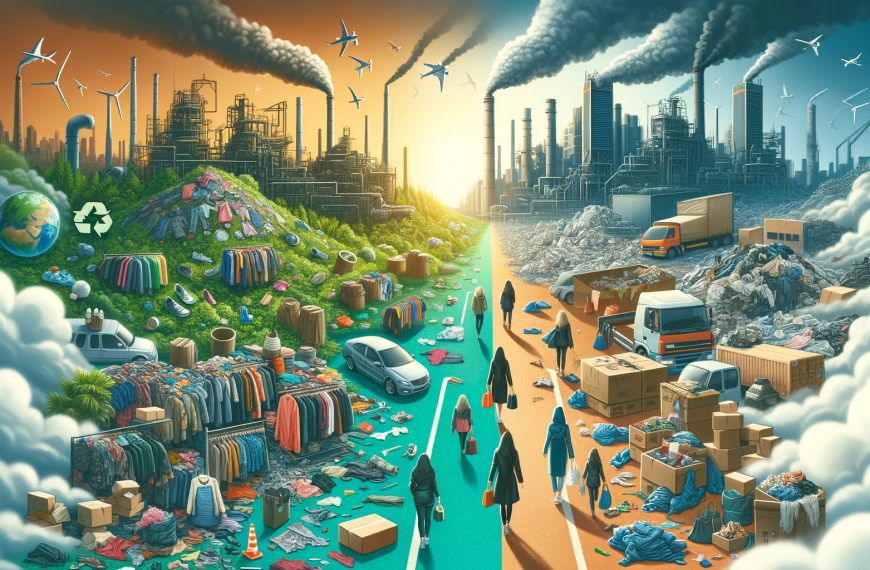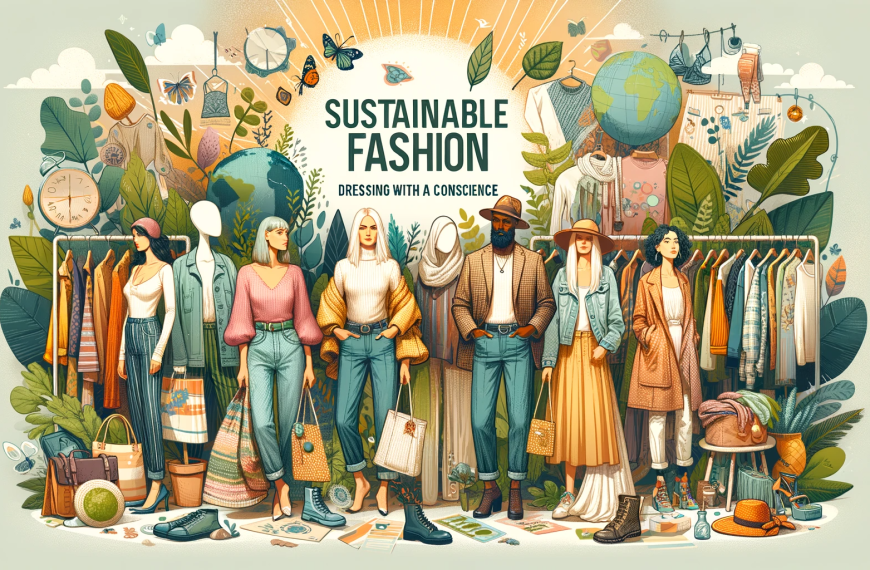At King Mongkut’s University of Technology Thonburi (KMUTT), sustainability is not just a concept but a guiding principle that shapes how we approach education, research, and community engagement. In line with Sustainable Development Goal 12 (SDG 12): Ensure Sustainable Consumption and Production Patterns, KMUTT is committed to fostering sustainable practices that minimize environmental impact while promoting the responsible use of resources. As we move into 2024, the university continues to play a vital role in encouraging sustainable consumption, production, and innovation across various aspects of campus life and beyond.
Promoting Sustainable Consumption on Campus
KMUTT has implemented a series of initiatives designed to reduce the ecological footprint of its daily operations and promote responsible consumption within the university community. The university recognizes that every individual action can contribute to a broader environmental impact, and as such, we actively encourage sustainable consumption among students, faculty, and staff.
One of the key strategies involves reducing waste and encouraging recycling across campus. Through well-established programs, KMUTT promotes the reuse of materials and the recycling of paper, plastic, and other materials, ensuring that waste is minimized. The university has implemented waste sorting stations and campaigns that educate the community on the importance of recycling and reducing single-use plastic. Students and staff are also encouraged to adopt more sustainable consumption habits, such as using reusable containers and reducing energy consumption.
Sustainable Production Practices in Research and Innovation
KMUTT is at the forefront of sustainable production through its commitment to research and innovation. The university’s faculty and students are involved in a range of initiatives that aim to develop sustainable technologies, methods, and solutions that address pressing environmental challenges. From renewable energy research to the development of eco-friendly materials, KMUTT is actively shaping the future of sustainable production.
In addition, KMUTT promotes the use of green technologies and sustainable practices in its own operations, such as implementing energy-efficient systems and reducing the environmental impact of campus facilities. The university encourages research that integrates sustainability across various fields, including engineering, architecture, design, and environmental science, supporting innovations that help reduce waste, energy consumption, and pollution.
Educational Initiatives for Sustainable Practices
Education is central to KMUTT’s approach to sustainability. The university has embedded sustainability into its curriculum, ensuring that students are equipped with the knowledge and skills necessary to address global environmental challenges. KMUTT’s students are taught the importance of sustainable practices, not only in their academic studies but also in their daily lives.
In 2024, KMUTT continues to offer programs and workshops that promote sustainable production and consumption across various disciplines. Through the Green Society and other sustainability-focused student organizations, KMUTT provides opportunities for students to engage in activities such as environmental clean-up campaigns, sustainable fashion events, and energy-saving initiatives. These activities not only raise awareness about sustainable practices but also encourage students to become agents of change in their communities.
Sustainable Campus Operations and Infrastructure
KMUTT has made significant strides in creating a sustainable campus that minimizes its environmental impact. The university’s commitment to green building practices has resulted in the construction of environmentally friendly buildings that are energy-efficient and equipped with sustainable materials. For example, the use of solar panels on campus helps reduce reliance on traditional energy sources, while water-saving technologies in restrooms and irrigation systems promote water conservation.
The university’s campus-wide sustainability efforts extend beyond physical infrastructure to include its transportation system, with initiatives aimed at reducing carbon emissions from vehicles. The promotion of cycling and the use of electric vehicles for campus transportation further supports the goal of sustainable commuting.
Community Engagement and Global Impact
KMUTT is not only focused on sustainability within the campus but also works to extend its commitment to sustainable consumption and production to the broader community. The university actively collaborates with local government organizations, businesses, and NGOs to promote sustainability outside of campus, ensuring that the knowledge and resources developed at KMUTT contribute to the local economy and society.
Through its involvement in various global networks and partnerships, KMUTT shares its sustainable practices and research with the wider world. The university plays a crucial role in driving global discussions on climate change, resource management, and sustainable innovation, contributing to the achievement of SDG 12 on a global scale.
In 2024, KMUTT continues to be a leader in promoting sustainable consumption and production patterns, both within the university and beyond. Through our efforts in research, education, campus operations, and community engagement, KMUTT is working to create a sustainable future where resources are used efficiently, waste is minimized, and the environment is protected for future generations. By integrating sustainability into every aspect of campus life, KMUTT ensures that students, staff, and faculty alike are equipped to contribute to a more sustainable world.
As the university moves forward, it remains committed to advancing SDG 12 through continued innovation, collaboration, and education, ensuring that sustainability remains a central focus of all its endeavors.
12.2 OPERATIONAL MEASURES
1. A policy on ethical sourcing of food and supplies
KMUTT provides a clear and concise policy on sustainable development, environmental preservation and sustainability. We pursue our HM The King’s sufficiency economy philosophy for sustainable development with surrounding communities; moreover, focusing on conservation of biodiversity and maintenance of ecosystem. To achieve the target, KMUTT transforms campus to be an integral learning space where staffs and students become a main role to contribute sustainable development awareness at every opportunity or as known as social change agent. In term of responsible consumption and production, KMUTT provides food safety policy to ensure that all students and staffs can access to clean water and healthy food. This would represent on their safety life while studying at KMUTT.
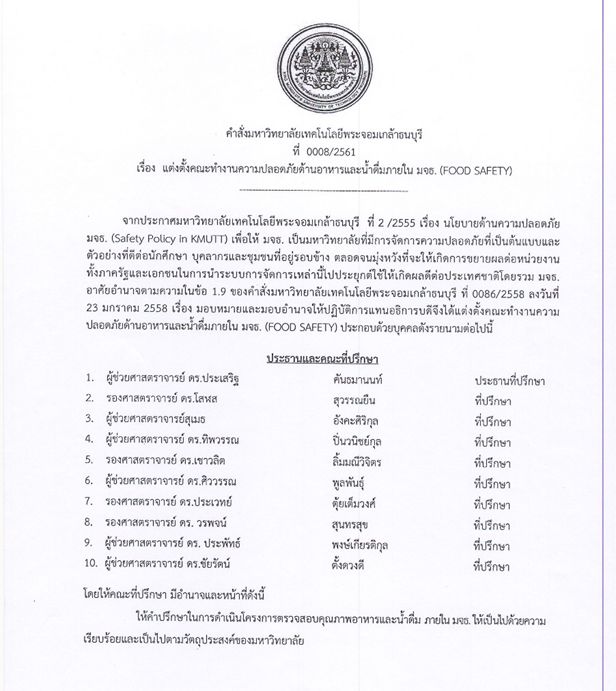
KMUTT provide a clear and concise policy on sustainable development, environmental preservation and sustainability. towards building a sustainable society is a modern and caring democratic society and develop the world’s ecosystems. Guidelines for this sustainable university. by adhering to the philosophy of sufficiency economy as a base for decision-making leading to the creation of graduates and personnel who help leaders of change to achieve a desirable society which the university supports. Promote and formulate policies for operations in accordance with the ministerial regulations prescribing supplies and procurement methods that the government wants to promote or support (No. 2) 2020. on environmentally friendly parcels with support Promote and publicize the personnel in the university departments to see the importance of and is ready to be a part of changing new behaviors, choosing products and services that are environmentally friendly. as well as aiming to expand the effect on both the public and private agencies to benefit the nation.
| Ministerial Regulations, Titles Determining Procurement and Purchasing Methods That the State Wants to Promote or Support, No. 2 |


Additional evidence link:
1. https://drive.google.com/file/d/1TMspEAFF3OA_w4DxP5utyuIVfWawekXR/view?usp=sharing
2. https://drive.google.com/file/d/1-yGE3xtY8NFClvloqKAuaWObx-RVX6_D/view?usp=sharing
3. https://drive.google.com/file/d/1ZJl3IylLuLEUAlCc8bv8hHGkyhgk0frk/view?usp=sharing
3. A policy, process or practice on waste disposal and hazardous materials
King Mongkut’s University of Technology Thonburi (KMUTT) has a clear policy towards becoming a sustainable university. We are committed to reducing the use and release of hazardous substances that affect the safety of students. By systematically reporting the possession, use and discharge of hazardous substances, hazardous wastes, KMUTT is a university with safety management that is a role model for students. It also aims to expand the impact on both public and private sectors in applying these management systems to the nation.

Handout of hazardous Waste of KMUTT
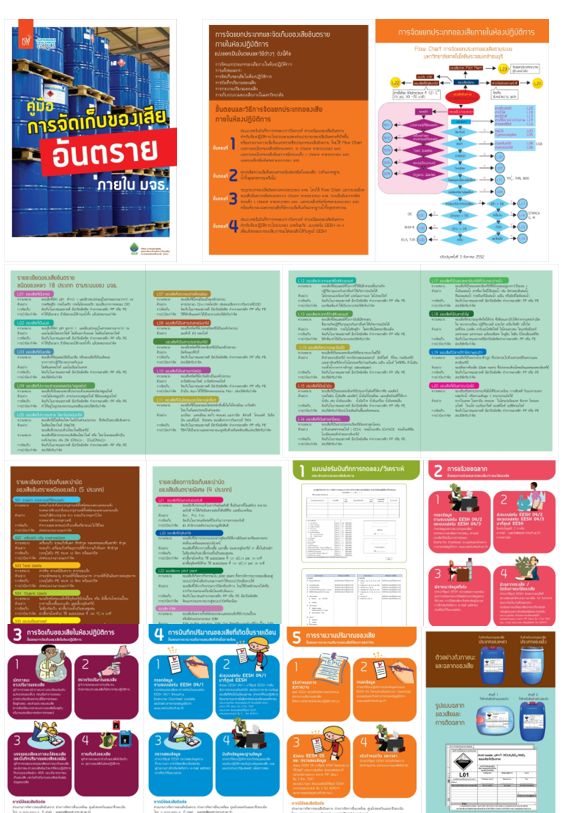
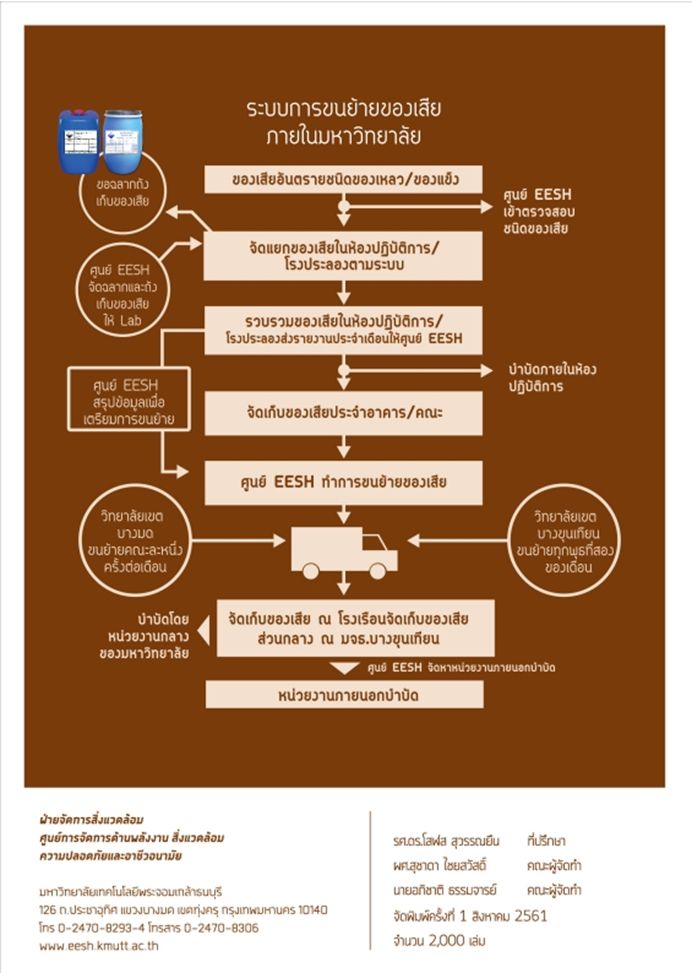
Additional evidence link:
- https://drive.google.com/file/d/1au4N9fzelDtE6j16u5m0vVpWwQfz6ahJ/view?usp=sharing
- http://sustainable.kmutt.ac.th/waste/
- https://drive.google.com/file/d/1ZJl3IylLuLEUAlCc8bv8hHGkyhgk0frk/view?usp=sharing
- https://sustainable.kmutt.ac.th/wp-content/uploads/2019/11/Hazardous-waste-collection-in-KMUTT.pdf
4. Policies around use minimisation
KMUTT’s Commitment to Sustainability and Waste Management
At King Mongkut’s University of Technology Thonburi (KMUTT), sustainability is more than just a concept; it is a guiding principle that shapes every aspect of our operations, decisions, and community engagements. As part of our commitment to becoming a sustainable university, we are dedicated to fostering a modern, caring society that values both social change and the protection and development of the world’s ecosystems. This vision is underpinned by the Sufficiency Economy Philosophy, a decision-making framework that promotes moderation, resilience, and the responsible use of resources to create a balanced and sustainable future.
Sufficiency Economy Philosophy as a Guiding Principle
The Sufficiency Economy Philosophy (SEP), inspired by the teachings of King Bhumibol Adulyadej, serves as the foundation for KMUTT’s approach to sustainability. This philosophy encourages responsible consumption, equitable development, and the efficient use of resources in a way that respects both human needs and the environment. By using SEP as our core philosophy, KMUTT emphasizes the importance of moderation in all aspects of life, avoiding excess and waste, while focusing on long-term sustainability and self-sufficiency.
This framework is not only applied to academic programs and research but also to the very fabric of university operations. From resource management to waste reduction, KMUTT is dedicated to adopting sustainable practices that reduce our ecological footprint and contribute to the betterment of society.
Creating Social Change Agents: Empowering Students and Staff
A key objective of KMUTT’s sustainability initiatives is to develop leaders of change—individuals who can inspire and drive progress toward a more sustainable society. We believe that education should not only impart knowledge but also foster the growth of social change agents—graduates and staff members who are equipped with the skills, values, and commitment to shape a better future.
KMUTT provides ample opportunities for students and staff to engage in sustainability activities, including community outreach, environmental advocacy, and hands-on initiatives. By equipping our community with the tools they need to promote sustainability, we aim to create a network of individuals who will drive change in their personal, professional, and academic spheres.
Waste Management: A Core Pillar of Sustainability
At KMUTT, waste management is at the heart of our sustainability efforts. The university has implemented a comprehensive waste management policy that encourages efficient waste handling, sorting, and recycling within the campus. By promoting waste sorting as a standard practice, KMUTT allows for the reuse and recycling of materials that would otherwise end up in landfills. This reduces the overall waste volume and conserves resources, contributing to a cleaner, greener campus.
KMUTT’s waste management system is supported by the university’s leadership, ensuring that it is not only a top priority but also a shared responsibility. The management system has been carefully developed to integrate waste collection, sorting, and transportation processes across the university campus and beyond. This coordinated system ensures that waste is managed properly, in compliance with local and international environmental standards.
Encouraging Active Participation from the KMUTT Community
One of the key aspects of KMUTT’s waste management policy is community engagement. The university encourages all members of the community—students, faculty, and staff—to actively participate in waste management efforts. Whether it’s through waste sorting programs, recycling initiatives, or educational campaigns, KMUTT fosters an environment where sustainability becomes a shared value and practice.
Through student-led projects, campus-wide awareness campaigns, and the integration of sustainability into the curriculum, KMUTT instills a strong sense of responsibility and accountability in our community. We encourage everyone to take personal ownership of their actions and contribute to the university’s waste management goals, ensuring that our sustainability efforts are not only top-down but also driven by the collective will of our community.
Promoting the Reduction of Single-Use Plastics
As part of KMUTT’s commitment to reducing waste, the university has implemented a campaign to eliminate single-use plastics from the campus. Single-use plastics, such as disposable bottles, straws, and packaging, contribute significantly to global waste and environmental degradation. To combat this, KMUTT promotes the use of reusable alternatives and environmentally friendly products, helping to reduce the campus’s reliance on single-use plastics.
This initiative is supported by a variety of practical measures, including the installation of water refill stations, encouraging the use of eco-friendly containers, and collaborating with vendors to reduce plastic packaging. KMUTT also educates students and staff about the environmental impact of single-use plastics and encourages them to adopt more sustainable practices in their daily lives.
For more information on KMUTT’s sustainability initiatives and our efforts to reduce waste and promote sustainable consumption, visit the following link:
KMUTT Waste Management and Sustainability Initiatives.
Handout for Waste Management of KMUTT


Solid waste generated within King Mongkut’s University of Technology Thonburi waste will be sorted into 5 categories: food waste, recyclable waste, non-recyclable waste, toxic waste, and material waste and some types of waste are used, for example, food waste will be brought into the biogas system. Recycled waste will go to the waste bank. Some of the scrap material is recycled or enters the waste bank.
The waste that KMUTT cannot processed in-house will then be sent to be disposed of through the BMA. The BMA will send to the Nong Khaem Solid Waste Disposal Center to enter the waste management system.
Nong Khaem Solid Waste Disposal Center
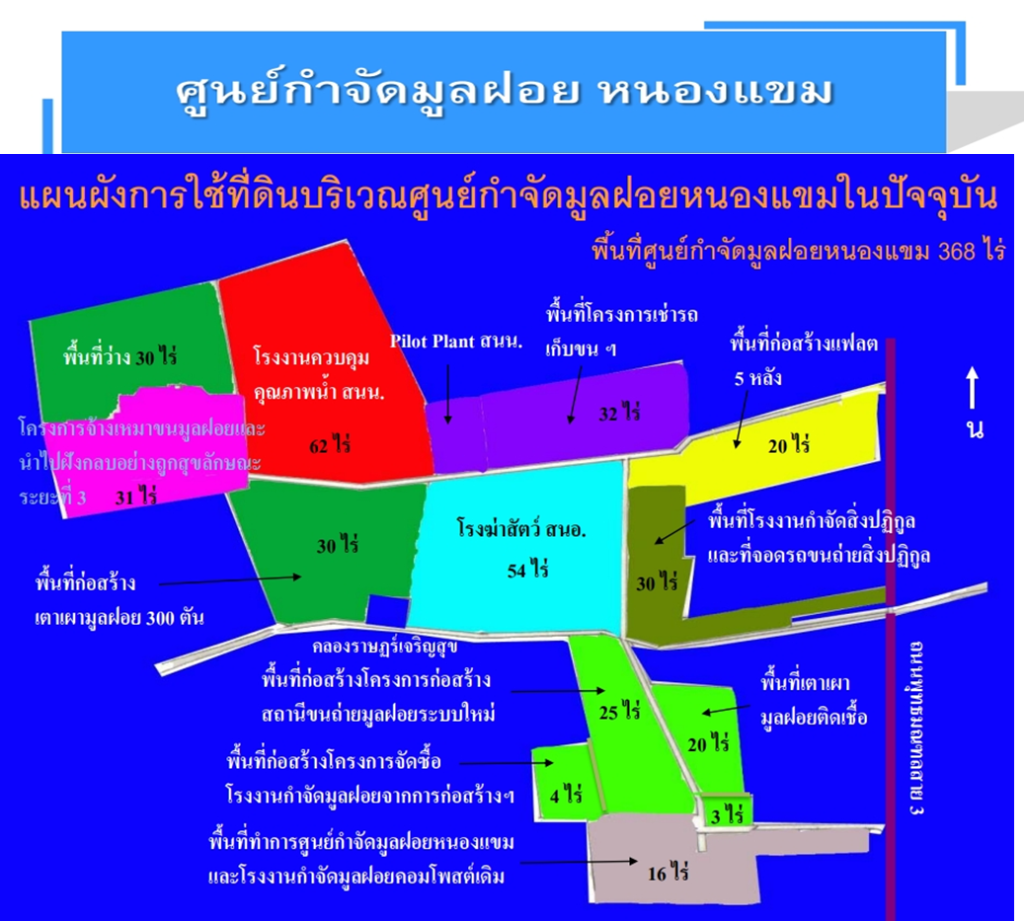
Additional evidence link:
1. https://sustainable.kmutt.ac.th/waste/say-no-to-single-use-plastics/
5. Policy for minimisation of plastic use
At King Mongkut’s University of Technology Thonburi (KMUTT), sustainability is deeply embedded in the university’s mission, and one of the most significant initiatives has been the Plastic Reduction Program. Initiated in 2015, the program aimed to reduce the use of single-use plastics, with a clear and ambitious goal: to eliminate the “BIG 4” plastic items—plastic bags, plastic bottles, plastic straws, and plastic spoons and forks—on campus by 2020. This comprehensive initiative has been a vital part of KMUTT’s broader efforts to foster environmental sustainability and contribute to a global reduction in plastic waste.
Launching the Plastic Reduction Campaign
The journey began in 2015, when KMUTT launched its first plastic reduction campaign, which focused on raising awareness and encouraging both students and staff to reduce their use of single-use plastics. One of the key actions was the Personal Mug Campaign, which promoted the use of personal mugs and bottles instead of disposable plastic bottles. This initiative aimed to reduce the consumption of plastic water bottles, one of the biggest contributors to plastic waste on campus. By encouraging everyone to carry their own reusable containers, KMUTT aimed to create a culture of sustainability and reduce its environmental footprint.
2018: Expanding the Efforts with “Say No to Single-Use Plastics”
In 2018, KMUTT significantly expanded its efforts with the launch of the “Say No to Single Use Plastics” campaign, a student engagement project that resonated with the broader community. This initiative was designed to align with the university’s goal of eliminating the use of single-use plastics by 2020 and encouraged everyone on campus to take responsibility for reducing their plastic consumption.
The campaign’s activities were tailored to raise awareness about the environmental impact of single-use plastics and promote sustainable alternatives. It was a multifaceted effort that involved student groups, faculty, and staff, all of whom played an active role in advocating for the reduction of plastic waste. The “Say No to Single-Use Plastics” project helped create a university-wide commitment to sustainability and brought attention to the importance of reducing plastic waste in everyday life.
Promoting Personal Food Containers and Reusable Items
In line with the “Say No to Single Use Plastics” campaign, KMUTT introduced another key initiative in 2018 to further combat plastic waste—promoting the use of Personal Food Containers. This initiative was aligned with the Personal Mug campaign, encouraging students and staff to bring their own reusable food containers to campus, especially when purchasing meals at canteens, food courts, coffee shops, and convenience stores.
To incentivize participation in this initiative, KMUTT offered a 5-baht discount at participating food vendors for students and staff who used their own personal food containers and personal mugs. This discount system not only helped reduce plastic waste but also encouraged a shift toward more sustainable consumption practices, making it easier and more attractive for the KMUTT community to adopt these practices.
Reducing Plastic Bag Usage
In addition to reducing plastic bottles and food-related plastics, KMUTT also launched a new campaign to tackle the widespread use of plastic bags. The university targeted incoming freshman students by promoting the use of fabric bags and reusable bags as an alternative to single-use plastic bags. This campaign was designed to instill sustainable habits from the very start of a student’s journey at KMUTT, ensuring that the practice of using reusable bags became a norm for the entire student body.
The Student Council at KMUTT also played a vital role in promoting the campaign across the campus. Through outreach, events, and constant communication, they helped spread the message of sustainability and encouraged students to actively participate in efforts to reduce plastic waste. Their efforts were instrumental in helping the university meet its goal of reducing plastic consumption and promoting a more sustainable campus culture.
A Unified Effort Toward Sustainability
Through these combined efforts—encouraging the use of personal mugs, food containers, fabric bags, and promoting awareness about the dangers of plastic waste—KMUTT has made significant strides toward reducing its environmental impact. The university’s commitment to sustainability has fostered a community-wide movement towards more responsible consumption and production patterns. With the participation of students, staff, and faculty, KMUTT has become a leader in sustainability in higher education, demonstrating the power of collective action in achieving environmental goals.
By setting and working toward clear sustainability targets, KMUTT not only aims to reduce plastic waste but also seeks to inspire future generations of students and staff to live in harmony with the environment. The university’s Plastic Reduction Program is a prime example of how a comprehensive, community-driven approach can make a tangible impact on global sustainability efforts.
KMUTT’s ongoing commitment to eliminating single-use plastics by 2020 stands as a testament to the power of education, awareness, and collaboration. Through its Plastic Reduction Program, the university has demonstrated that every action, no matter how small, contributes to a larger goal of creating a more sustainable world. By continuing to promote sustainable consumption, waste reduction, and environmental consciousness, KMUTT has set a strong example for other institutions and individuals to follow.
As we move beyond 2020, KMUTT will continue to advance sustainability efforts and work towards even more ambitious environmental goals, ensuring that the principles of responsible consumption and sustainable production remain at the heart of everything we do.
| Policy to reduce the use of single-use plastics (Single use Plastics) |

Additional evidence link:
1.https://sustainable.kmutt.ac.th/waste/say-no-to-single-use-plastics/
2.https://drive.google.com/file/d/1ZJl3IylLuLEUAlCc8bv8hHGkyhgk0frk/view?usp=sharing
6. Policy for minimization of disposable items
At King Mongkut’s University of Technology Thonburi (KMUTT), sustainability is a key pillar of our mission, and waste management plays a crucial role in our commitment to creating a more environmentally responsible campus. The university has established a comprehensive waste management system that encourages both students and staff to engage in sustainable practices, focusing on reduce, reuse, recycle, treatment, and responsible disposal. This system aligns with SDG 2030 and the global push for sustainability, aiming to reduce the environmental impact of waste while ensuring compliance with standard practices and regulations.
1. Waste Minimization and Waste Reduction
KMUTT is committed to waste minimization and waste reduction as key strategies to prevent waste from being generated in the first place. This involves promoting source reduction—a practice that encourages efficient use of resources to limit waste generation. The university actively encourages the reduction of hazardous chemicals on campus, pushing for safer, non-toxic alternatives wherever possible.
In addition, KMUTT promotes the use of products that can be reused or recycled to limit the creation of waste. This approach not only conserves resources but also significantly reduces the environmental footprint of the university. Educational campaigns and initiatives engage the campus community, motivating both students and staff to embrace sustainable habits that reduce the need for disposable items.
2. Reuse and Repair
At KMUTT, reuse and repair are essential parts of our waste management approach. The university encourages students, staff, and faculty to reuse equipment, materials, or chemicals whenever possible, reducing the demand for new resources and minimizing waste. For example, rather than discarding old equipment or materials, we promote efforts to repair and refurbish them for continued use.
By extending the life of materials and equipment through repair and reuse, KMUTT not only conserves resources but also fosters a circular economy mindset within the campus community. This reduces both the environmental impact and the need for the continuous consumption of new resources, supporting the principles of sustainability and responsibility.
3. Recycling: A Key to Circular Economy
Recycling is one of the most critical components of KMUTT’s waste management strategy. The university actively promotes the recycling of materials such as aluminum and steel cans, cardboard, glass bottles, paper, plastic cartons, scrap metal, and textiles. A dedicated recycling waste bank has been set up on campus to facilitate easy sorting and recycling of these materials, making it more convenient for students and staff to participate in recycling efforts.
In addition to these materials, KMUTT also encourages the recycling of hazardous materials or chemicals, where possible. By providing proper disposal and recycling options for these substances, KMUTT ensures that even potentially harmful materials are dealt with in an environmentally safe and responsible manner, further contributing to the reduction of environmental impact.
4. Waste Treatment: Safe and Standardized Practices
KMUTT adheres to standard practices for both municipal solid waste and hazardous waste treatment, ensuring compliance with environmental regulations and the highest safety standards. The university’s waste management system prioritizes safe treatment processes for waste disposal, reducing the risks of contamination or environmental harm.
Both types of waste are carefully categorized and managed, with specialized treatment protocols in place to handle them in a way that minimizes their impact on the environment. KMUTT continues to refine its waste treatment practices to ensure they meet national and international standards, in line with best practices in environmental management.
5. Responsible Disposal of Waste
KMUTT ensures that the disposal of all types of waste—municipal solid waste, hazardous waste, and electronic waste (e-waste)—is carried out in a responsible and regulated manner. By following strict disposal guidelines and ensuring that waste is handled according to standard practices, the university minimizes the potential negative impacts of improper disposal.
For e-waste, the university has established systems to properly recycle and dispose of electronic devices in a way that prevents environmental contamination and promotes the recovery of valuable materials. Similarly, hazardous materials are disposed of safely, following legal regulations and environmental protection standards.
| KMUTT Waste Management Policy |
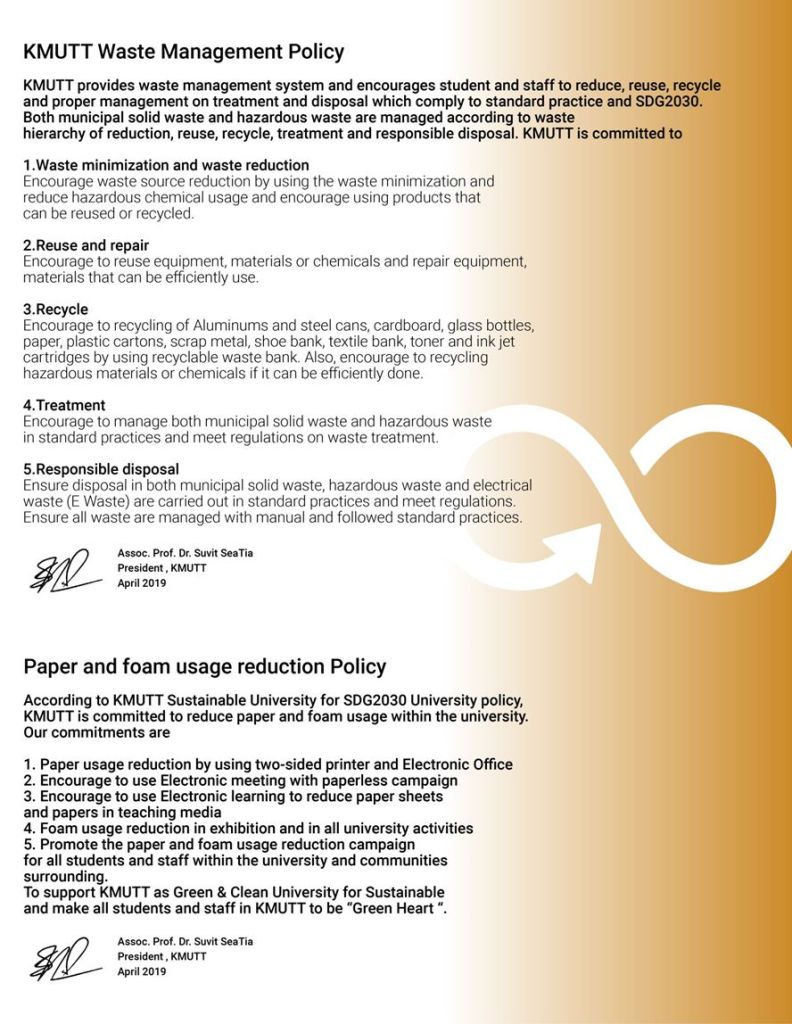
Additional evidence link:
1. https://sustainable.kmutt.ac.th/waste/kmutt-waste-management-policy/
2. https://drive.google.com/file/d/1ZJl3IylLuLEUAlCc8bv8hHGkyhgk0frk/view?usp=sharing
7. Disposable policy: extensions to service
In 2019, KMUTT launch the new campaign to reduce plastic bag by promote all freshman to use fabric bag and reuse bag. All freshmen students get their own fabric bag from University at the beginning of the year. Also, there are more than 20 “Please Reuse Me “corners within campus where provide fabric bags for borrowing . Furthermore, KMUTT communicate all student and staff to join this campaign by using E communication via Facebook, Line, Instagram and video clip to promote KMUTT’s fabric bag usage which provide for all in a reasonable price in KMUTT bookstore . All convenient stores such as 7-ELEVEN, Amazon and D’ORO coffee shop, bookstores, outsources, canteen and food courts within KMUTT have joined the campaign .Moreover, KMUTT Student council promote this campaign to all students in KMUTT which make KMUTT can reach our goal to plastic usage reduction by 2020. According to our activities above , the result in 2019 shows 60% reduction of plastics usage in KMUTT compare to 2017 baseline.





Additional evidence link:
1. https://pr.kmutt.ac.th/pr2/campus-news-whos-news/
2. http://sustainable.kmutt.ac.th/waste/kmutt-waste-management-policy/
3. https://drive.google.com/file/d/1TMspEAFF3OA_w4DxP5utyuIVfWawekXR/view?usp=sharing
4. https://drive.google.com/file/d/1ZJl3IylLuLEUAlCc8bv8hHGkyhgk0frk/view?usp=sharing
5. https://youtu.be/xNQEN_b4fk0
8. Minimisation policies extended to suppliers
KMUTT launch the new campaign to reduce plastic bag by promote all freshman to use fabric bag and reuse bag. All students get their own fabric bag from University at the beginning of the year. Also, there are more than 20 “Please Reuse Me “corners within campus where provide fabric bags for borrowing . Furthermore, KMUTT communicate all student and staff to join this campaign by using E communication via Facebook, Line, Instagram and video clip to promote KMUTT’s fabric bag usage which provide for all in a reasonable price in KMUTT bookstore . All convenient stores such as 7-ELEVEN, Amazon and D’ORO coffee shop, bookstores, outsources, canteen and food courts within KMUTT have joined the campaign .Moreover, KMUTT Student council promote this campaign to all students in KMUTT which make KMUTT can reach our goal to plastic usage reduction by 2020. According to our activities above , the result in 2019 shows 60% reduction of plastics usage in KMUTT compare to 2017 baseline.
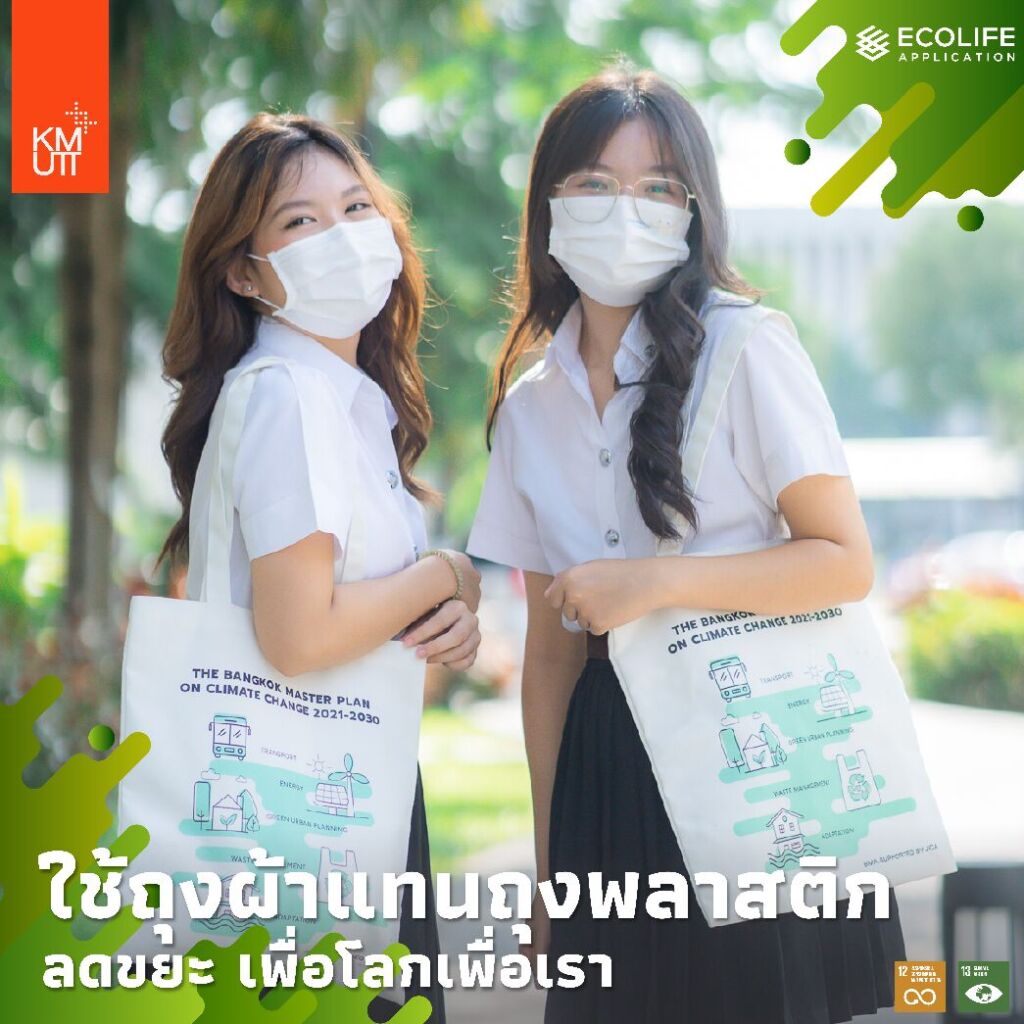
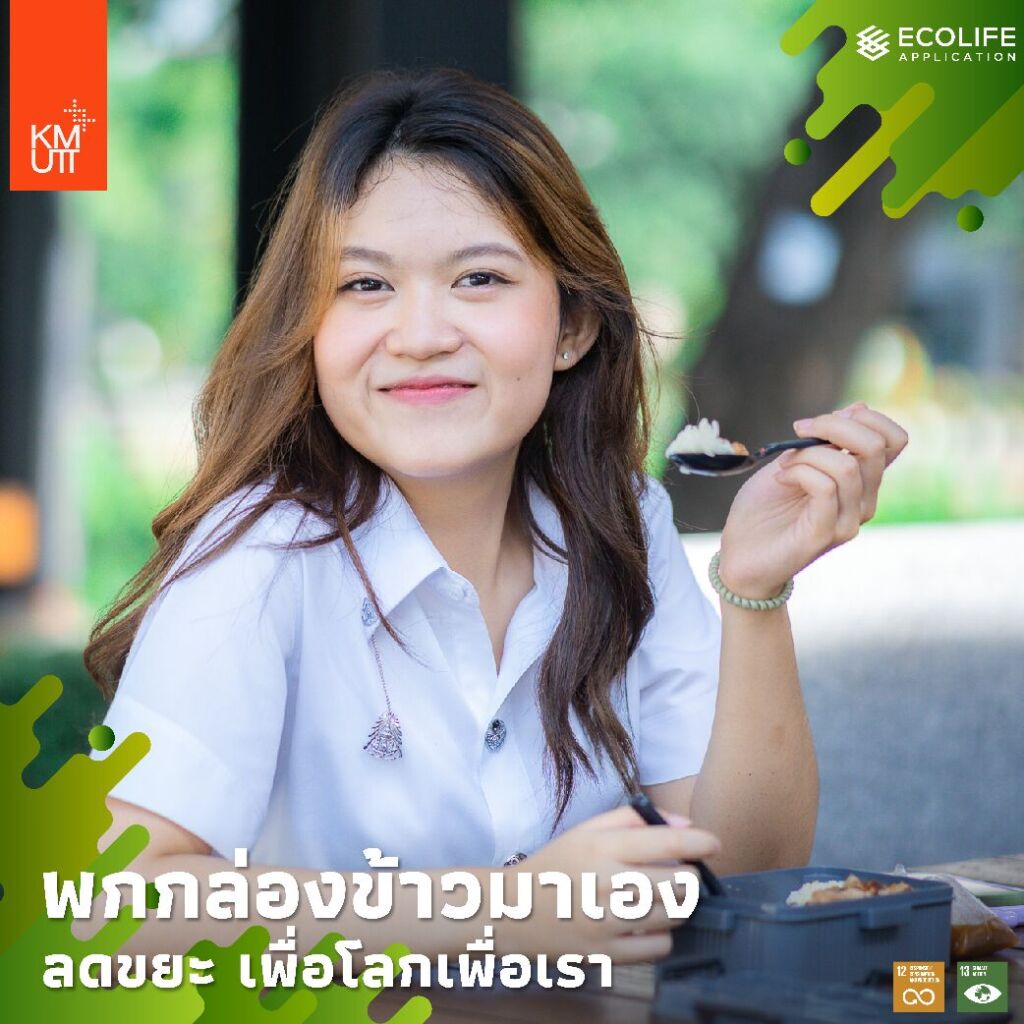
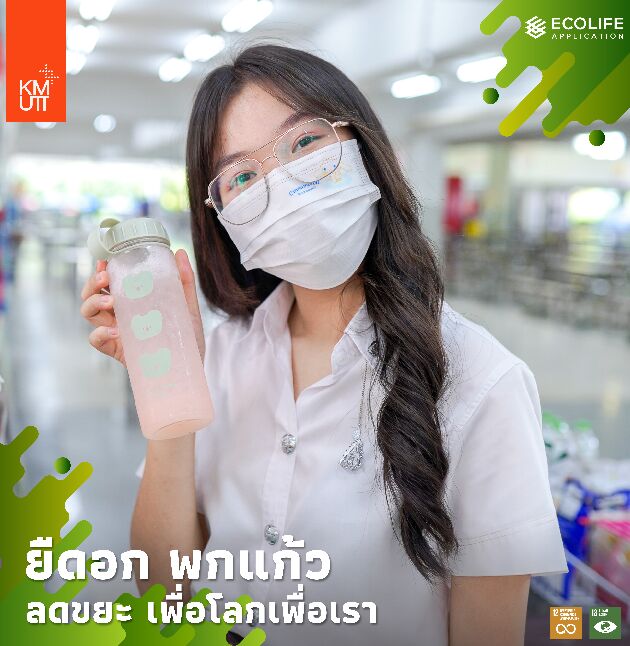
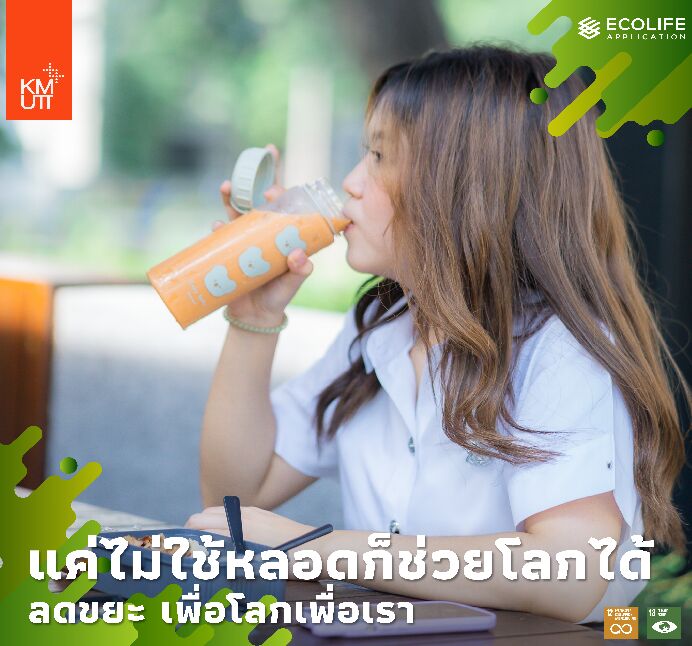
King Mongkut’s University of Technology Thonburi has a practice and has an environmentally friendly procurement policy.
| KMUTT Policy environmentally friendly supplies |
| Definition “Chapter 7/2 environmentally friendly supplies Article 27/4 In this section, “environmentally friendly supplies” means goods or services that affect less environmental over or lower than the same product but has the same qualities or qualities or higher than the same product or service considering Procedures for raw material procurement, production, transportation, and reuse, recycle and disposal” |

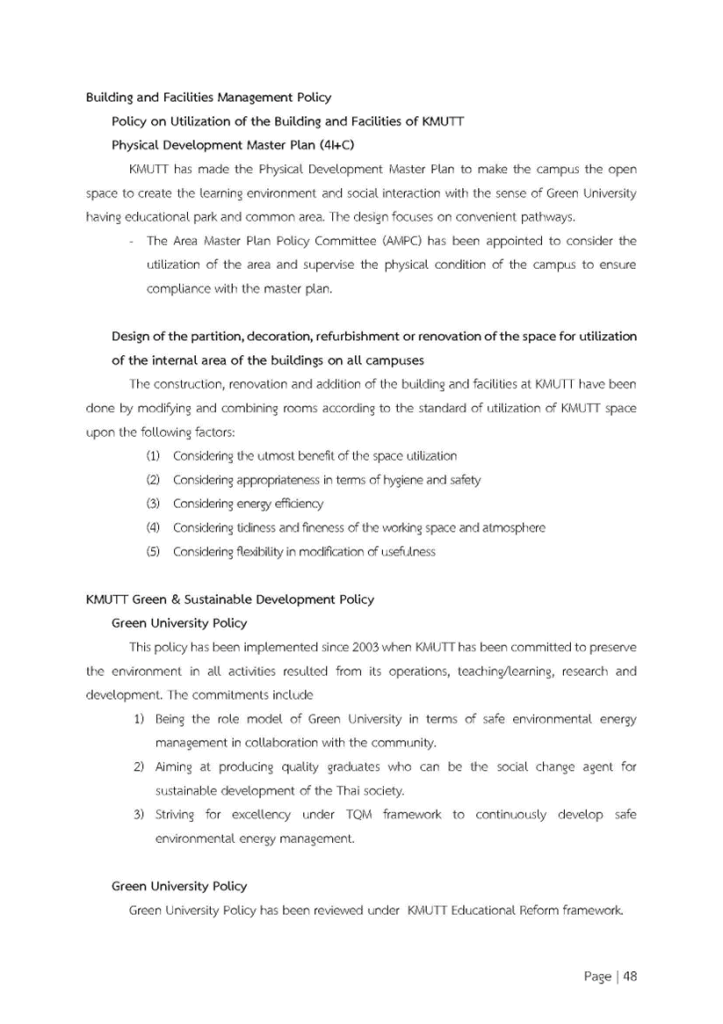
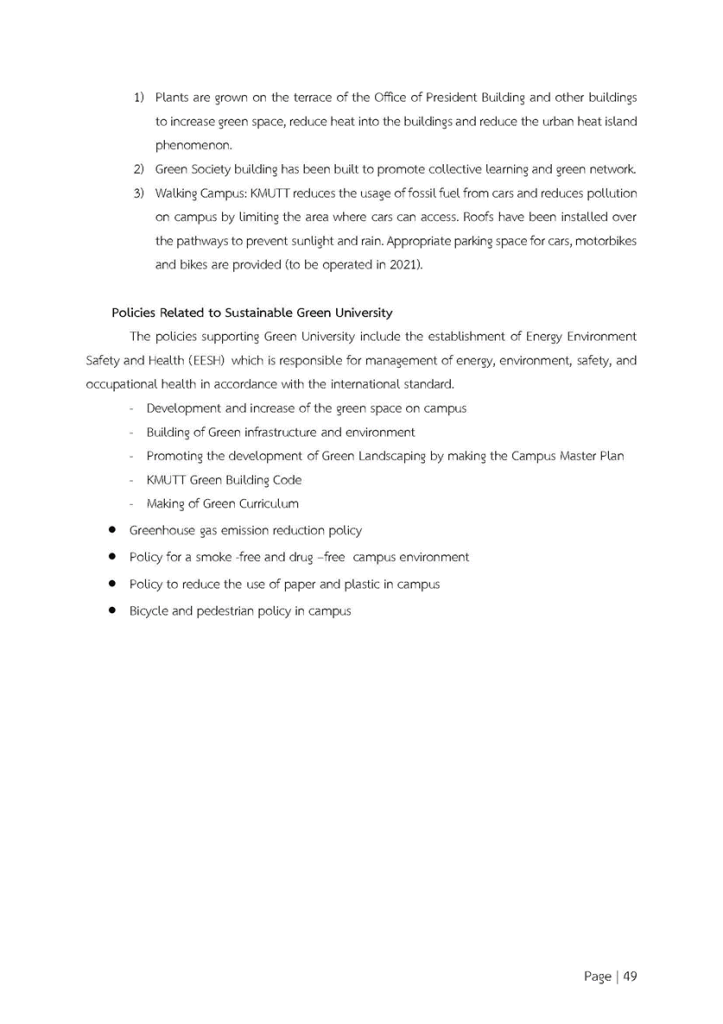
Learning Exchange building
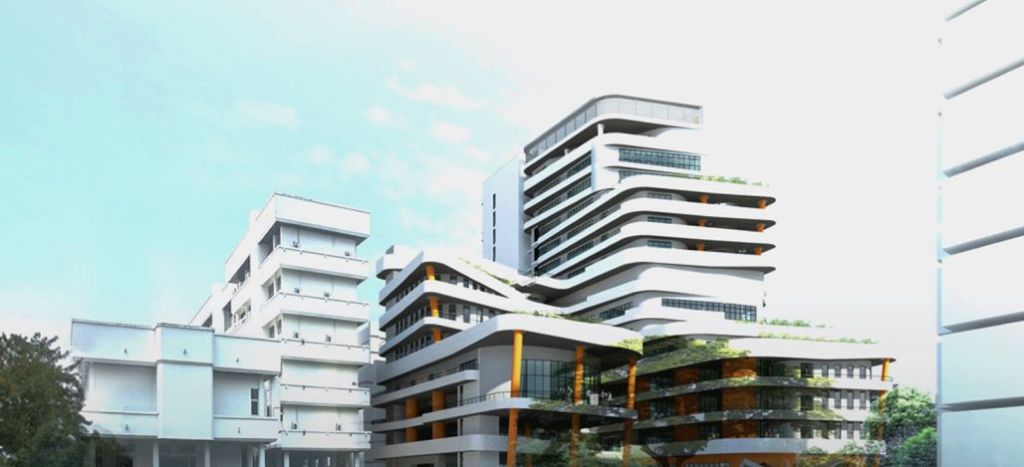
Learning Exchange building (LX) at Bangmod campus was opened for services in October 2019. The concept design of building is for education in the 21st century under the slogan of “EVERY WHERE IS FOR LEARNING, EVERTY TIME IS LEARNING AND EVERY ONE IS EDUCATOR”. This building is designed and constructed base on US Green Building Council’s LEED rating system. TREES help guiding for design and construct architecture that is environmentally friendly and can increase occupant well–being and productivity comprehensively. The following table shows construction materials which not only made from recycled material but also receive green or eco label as follows:
R– Products made from recycled material
L– In–house product ( save energy on transportation and support local business)
G– Green products and eco label
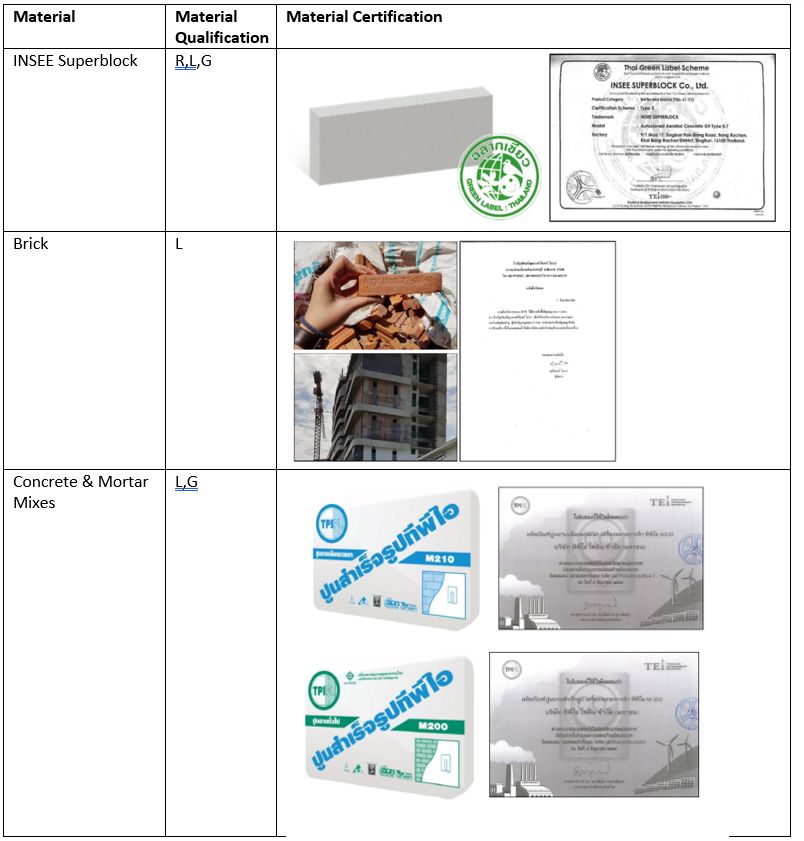





Additional evidence link:
1. http://sustainable.kmutt.ac.th
2. https://pam.kmutt.ac.th/
3. https://bit.ly/2JJPnk7
4. https://drive.google.com/file/d/1TMspEAFF3OA_w4DxP5utyuIVfWawekXR/view?usp=sharing
5. https://drive.google.com/file/d/1ZJl3IylLuLEUAlCc8bv8hHGkyhgk0frk/view?usp=sharing
6. https://youtu.be/xNQEN_b4fk0
12.3 PROPORTION OF RECYCLED WASTE
1. Related information on our university as a body on measuring the amount of waste generated and recycled across the university.

1. Amount of waste generated
Description: King Mongkut’s University of Technology Thonburi the amount of waste generated is 604,615 kg/year.
2. Amount of waste recycled
Description: King Mongkut’s University of Technology Thonburi Recycled waste 122,454 kg/year
3. Amount of waste sent to landfill
Description: King Mongkut’s University of Technology Thonburi has garbage sent to the landfill waste 469,019 kg/year.
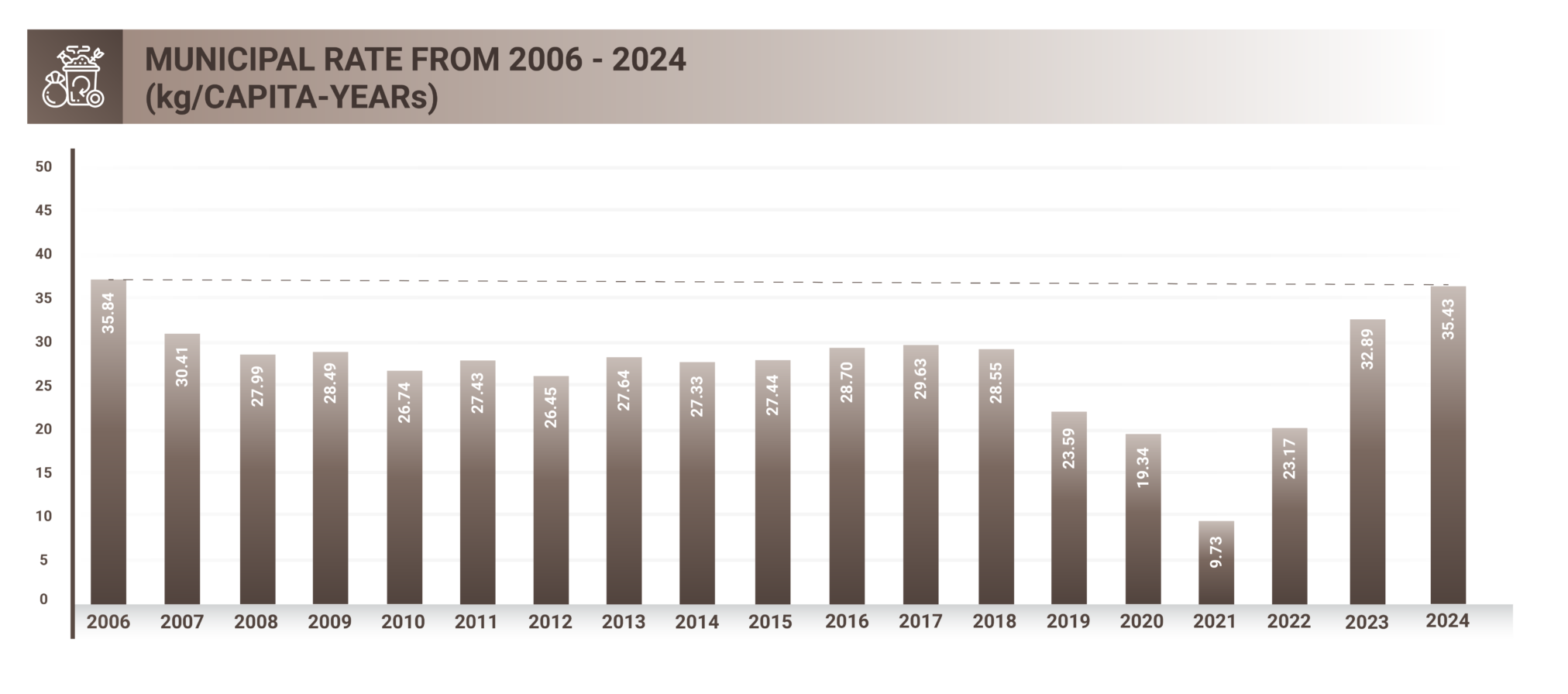
To achieve the KMUTT university policy, municipal solid waste (MSW) management system has been developed since 2002. The system consists of the three main parts: waste segregation, waste collection and waste utilization. Organic waste, recycled waste, non-recycled waste, toxic waste and workshop waste are generate within campus. The system is continuously developing through various activities such as exhibition and training program, which occur 5 times per year. The chart below provides information on the rate of municipal solid waste generation in kilograms/capita-year. Most recently, the generation rate of municipal solid waste, Garden waste, was 35.43 kilograms/capita-year in early 2006. At 35.84 kilograms/person per year, in 2024 it may be reduced by 1.14 %.
KMUTT Municipal solid wastes in 2024
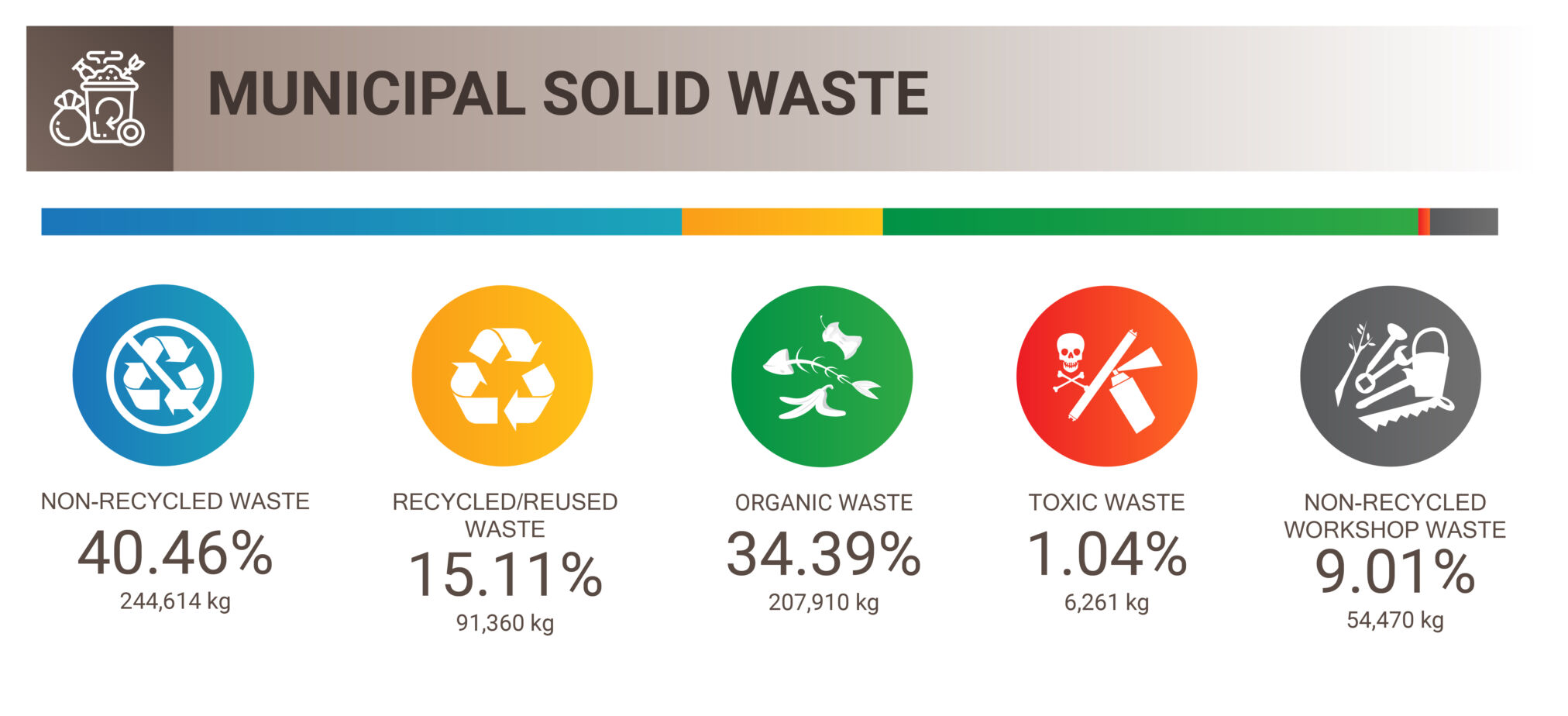
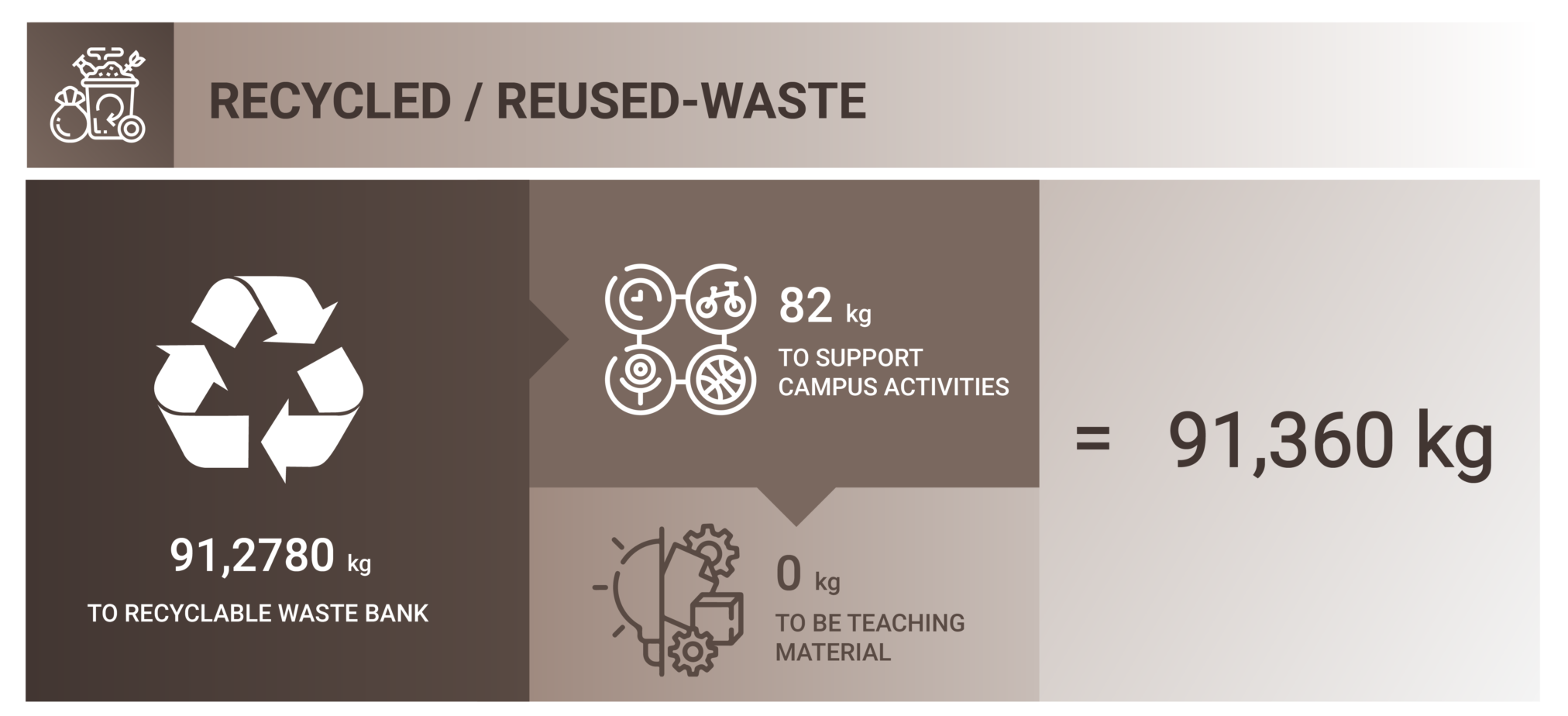
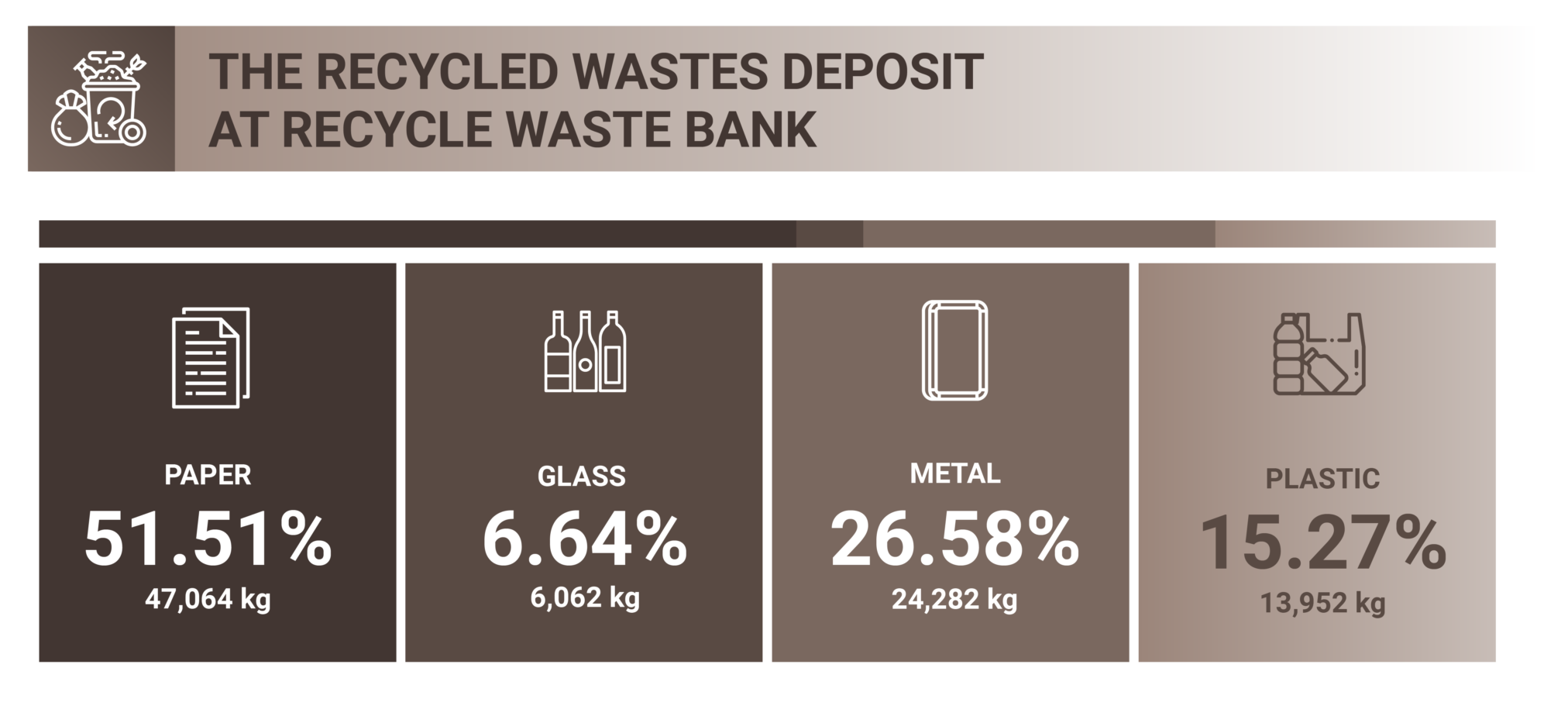
Additional evidence link:
12.4 PUBLICATION OF SUSTAINABILITY REPORT
1. Related information on our publication of sustainability report.

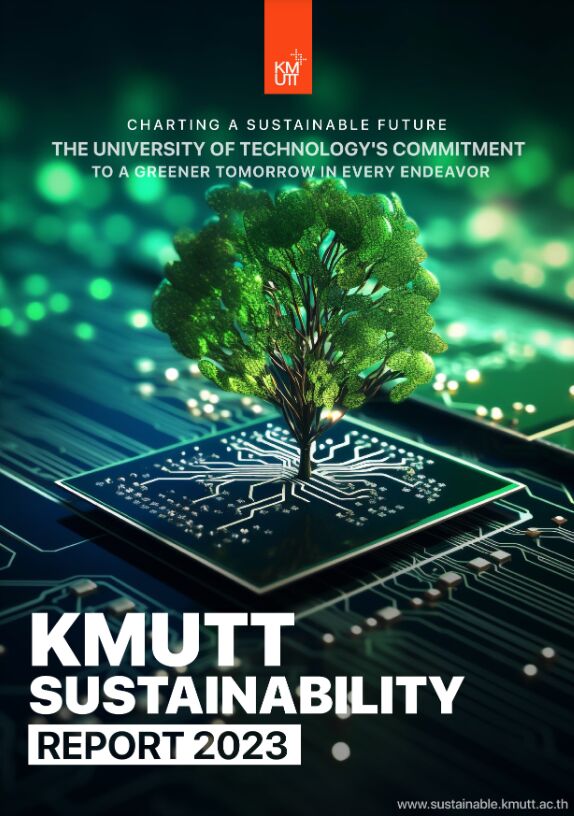
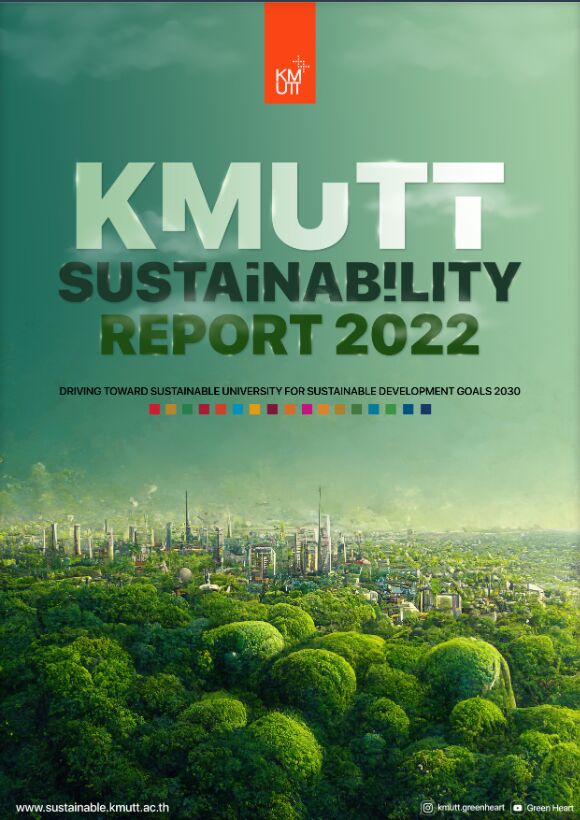
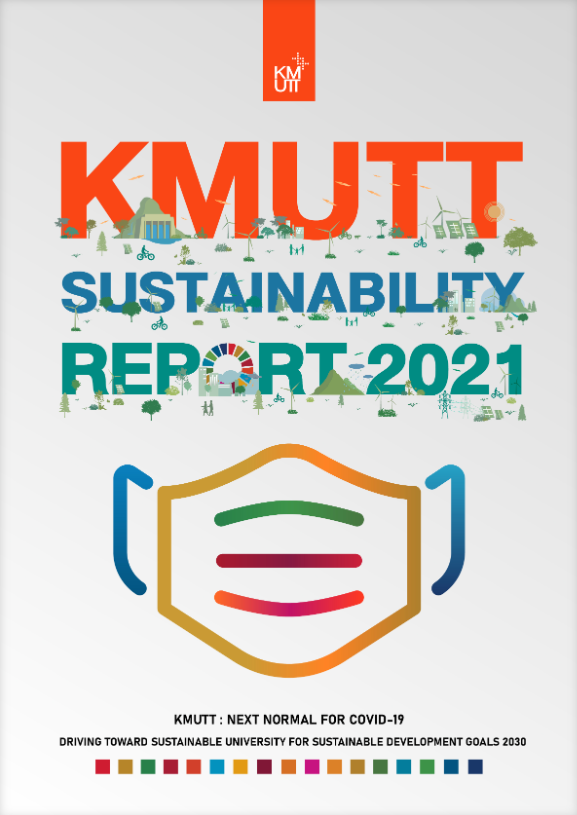
KMUTT Sustainable Report 2022 (English Version) available on this
link: https://kmutt.me/SustainabilityReport2022
KMUTT Sustainability Report 2021 (English Version) available on this
link: http://online.anyflip.com/slpro/ssod/mobile/index.html
KMUTT Sustainability Report 2020 (English Version) available on this
link: https://online.anyflip.com/slpro/tnda/mobile/index.html
KMUTT Sustainability Report 2019 (English Version) available on this
link: https://online.anyflip.com/slpro/pbhx/mobile/
KMUTT Sustainability Report 2018 (English Version) available on this
link: http://online.anyflip.com/slpro/ukzu/mobile/
Sustainability at KMUTT EBOOK available on this


